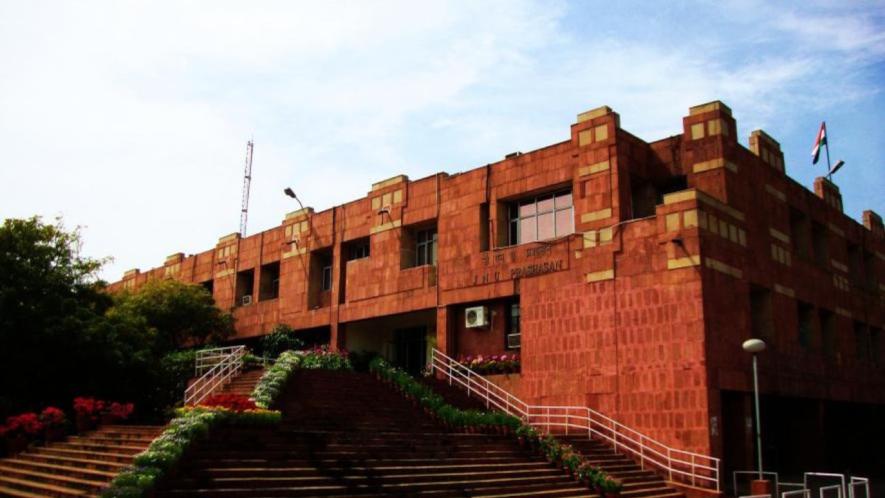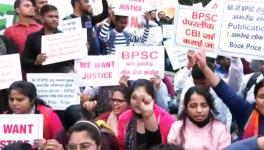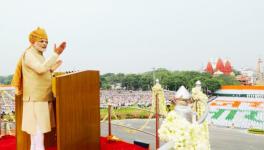Media Trials to Cinema: Systematic Onslaught on JNU Continues

File Image
It is not uncommon these days to see a regime using institutions at its disposal to launch a systematic attack against those critical of its ideas and policies. There have also been cases where the ‘Big Media’, for increasing its own TRPs and audience engagement, have sensationalised or dramatised events, carrying out media trials even before the justice system can begin a fair trial. As R. Surette, an expert in criminology, says, “Media trials are defined as certain regional or national news 'events' in which the criminal justice system is co-opted by the media as a source of high drama and entertainment.”
Take the case of Jawaharlal Nehru University (JNU). In 2016, the JNU Students’ Union (JNUSU) under the presidentship of Kanhaiya Kumar (now a Congress leader), saw three students -- Umar Khalid, Anirban Bhattacharya, and Kumar himself -- arrested by Delhi Police. Before the police could even file a chargesheet, national TV channels had begun media trials, announcing their own verdicts on the three students and on the university. Thus began an era of JNU being termed as an “anti-national” university.
As an extension to this, recently a film on JNU was released, renaming it as Jahangir National University. Careful consideration was given to the choice of the name, in order to further push the “anti-national” narrative of the Hindutva regime, where the reference to Jahangir implies the Muslim community, in a bid to add a “terrorist” flavour to the university’s name. The movie’s propaganda didn’t stop with its name. It went on to defame JNU through a skewed portrayal of its students. This article attempts to dissect this film to understand the almost decade-long defamatory onslaught against JNU not just by the media, but some Hindi films, such as Kashmir Files and Bastar: A Naxal Story.
The film, Jahangir National University, is part of the systematic Right-wing effort to portray JNU as a hub of “anti-national” activities. A university renowned worldwide for its academic excellence and progressive student and teacher activism is under siege, presided over by the current Bharatiya Janata Party/Rashtriya Swayamsevak Sangh regime.
The political targeting of JNU students and faculty has been a consistent strategy of BJP/RSS to discredit the premier institution. In the past decade, there have been many instances where students were labelled as “anti-national”, “terrorists” and “parasites” living on taxpayer money. Several legal cases on students and teachers were slapped, but nothing has been proved against them so far. All this was aimed to suppress voices demanding ‘education for all’, aimed at saving public education and fighting for social and gender justice.
The film, Jahangir National University, marks another failed attempt at defamation. The film depicts JNU as an immoral and corrupt place where female students are projected as having “questionable” characters who are shown as intoxicated at all times. This is not only a gross misrepresentation but also an affront to the values and progressive struggles for gender equality that JNU stands for.
For instance, GSCASH (Gender Sensitisation Committee Against Sexual Harassment), a body which came into existence after years of debates and countless student activism, was the first to address complaints of sexual harassment within institutions and chalk out a plan toward preventing such grievances. It ensured that JNU was one of the most free and safe campuses in the country for female students and students of other gender minorities. After JNU, such committees were set up in several educational institutions across the country.
However, in an outrageous distortion of this progressive body, the film depicts GSCASH as a ‘weapon’ that can be used by women against men. The film shows a female student tearing her own clothes and threatening a male student, saying that "Ise to ham GSCASH mai dekh lenge" (We will set him right in GSCASH)
The misogynistic, patriarchal and anti-women dialogues that run throughout the film, such as “Pyaar me dhokha dene wali kamini’, Aapki chudail badi kamaal ki hai” and “Dada ladki toh bomb hai bilkul”, are flung around as JNU’s common lingo. However, those who have spent some time in JNU can testify against such a portrayal.
However, the filmmaker seems to have unintentionally done some justice in portraying the Right-wing groups on campus as they are -- using abusive language, passing lewd remarks on female students and showing off their muscle, money and feudal tendencies.
The film is full of factual inaccuracies. For instance, it shows a Hindi-medium student being thrown out of an English learning class. The rationale given is that he belongs to the ‘general’ category and that course was exclusively for ‘reserved’ (marginalised) category students. The student has been shown thrown out the lecture hall because he is unable to answer in English. Later, humiliated and dejected, he dies by suicide.
This is an utterly false representation of JNU’s inclusive culture. The Language Empowerment Cell (LEC) set up in the university to develop academic writing skills and language empowerment for students coming from regional language backgrounds is available to all in JNU. The university’s culture places immense emphasis on interdisciplinarity of classes. If a student sits in a lecture outside his/her selected course, he/she is never thrown out, rather they are encouraged. Many students do so and till date there has been no instance
of any student thrown out from class for not being able to speak in English.
The movie also distorts the timeline of events in JNU. For
Instance, it tries to show that all Leftist student organisations have been in election alliance since 2013. The fact is that it was only after 2015, after 14 years, that ABVP’s Saurabh Sharma (the hero figure in the film) won the post of JNUSU joint secretary by 27 votes, that the Left student alliance was
formed. Before that, Left student organisations had been contesting elections separately.
The film also makes an attempt to justify the campus violence by alleged ABVP members and supporters on January 5, during the historic student movement against fee hike. Dozens of students and professors were attacked and injured, including the then JNUSU president Aishe Ghosh.
From a cinematic perspective, too, the film fails miserably. It suffers from poor acting, dialogue writing, cinematography, and a narrative filled with contorted facts. Interestingly, even some Right-wing people are angry over the way they have been depicted.
Why is JNU a target?
Revolutionary freedom fighter Bhagat Singh had said, “Anyone who stands and advocates progress must question, doubt, and challenge every aspect of the old faith.” The responsibility of any university is to develop critical thinking in its students. At a time when we are ruled by a government that fears the intellect of its citizens, a university has become the biggest quagmire for it and they are trying to do everything to destroy it. So, why is JNU always a target?
The answer lies in the values and principles that are the cornerstone of JNU. The university has witnessed generations of student movements and activism, historic struggles and has shaped up as a progressive and democratic space. As an institution, JNU stands for the ideals of inclusive, accessible and affordable education – the very ethos the fascist state wants to destroy.
JNU has set an example with one of the most progressive reservation policies in the country. All female students are accorded 5 deprivation points regardless of social categories. This has led to healthy sex-ratio in the campus relative to other universities in India. It was the first university to introduce the concept of quartile districts to offer deprivation points to students who had done their schooling or college from socially and economically backward geographical regions.
Also, JNU prides itself for having one of the lowest tuition and hostel fee (Rs 268 admission fee and Rs 108 for every semester registration) structures and fighting tooth and nail against the Narendra Modi-led BJP government’s bid to hike the fee. However, what makes JNU the nemesis of the Right- wing is the fact that it represents a dream. A dream that can be seen and achieved by the children of workers, farmers, adivasi and every marginalised section of the country. A dream that cannot be thwarted because of lack of money or resources. A dream for quality education that does not burn a hole in the pocket, offering a space that values and encourages critical thought and freedom of expression.
Under this regime, JNU has been struggling due to seat cuts, massive fund cuts, affecting infrastructure. JNU’s few annual reports reveal a huge decline in academic expenditure. In 2015-16, it used to spend around Rs 30.28 crore annually on academic activities, such as fieldwork, seminars, workshops, participation in conferences, laboratory running, scholarships/stipends, which plunged to Rs 12.78 crore in 2021-22.
Now it seems JNU academic calendar is effectively determined by the National Testing Agency rather than within the university. Without any proper discussion, the admission process for under-graduate, post-graduate and Ph.D courses was centralised. Although, there was no compulsion for JNU to adopt the CUET (common university entrance test) system. On August 28, 2023, the Central government, while responding to a Public Interest Litigation (PIL), informed the Delhi High Court that CUET was not compulsory for Central Universities and that on matters of admission as institutions of higher learning they were autonomous and free to adopt what was best for them.
After the shift away from its own entrance examination and the elimination of the deprivation points system in admission to research programmes, the share of women students in JNU’s total strength has fallen. In 2015-16, it was 50.2%, and decreased to 42.89% in 2022-23.
Another reflection of the new admission process is the decline in the proportion of research students. The number of research scholars has declined from 5,432 in 2016-17 to 4,098 in 2022-23.
Along with this, this centralised admission policy ended many course specialisations in a campus where you could hear every Indian language, got a chance to see the culture of every state.
A report by the Jawaharlal Nehru University Teachers’ Association (JNUTA), released on September 5, 2023, shows that people only from one particular ideology were being selected in new faculty appointments and along with this, promotions of senior faculty members were being stopped. The study revealed that 276 faculty members, virtually the entire strength of the body of Assistant and Associate Professors, were eligible for one or more promotions. A survey among those teachers showed that four years or more had lapsed since the date of eligibility for 76.4% of faculty waiting for promotions. Further, 62% had reached the stage where even their next promotion was due.
The student movement in JNU is also going through a challenging phase. In the new Chief Proctor Manual, every voice raised for the basic needs and interests of the students is being targeted. Instead of the immediate redressal of the complaints, the Proctor’s Office slapped a fine of Rs 5,000 on a student survivor of sexual harassment, in a notice issued on May 31, 2024. Her only alleged crime was that she demanded justice. In addition, 21 students who stood with her in this fight for justice were also fined. Protests have been banned within a radius of 100 meters of every academic and administrative building.
But despite all these attacks, JNU students and teachers are struggling with all their might to save its core values. The results of the student union elections held after a gap of four years in March 2024 confirm this to some extent.
“One thing the current regime should learn is that the history of JNU is a history of struggles and JNU always fights back. From the time of Emergency to the planned attack to declare the university ‘anti-national’ in 2016, we have fought and won,” says Avijit Ghosh, JNUSU vice president on the continuous attacks on JNU.
The writer is doing a Master's in International Relations, Jawaharlal Nehru University, Delhi. The views are personal.
Get the latest reports & analysis with people's perspective on Protests, movements & deep analytical videos, discussions of the current affairs in your Telegram app. Subscribe to NewsClick's Telegram channel & get Real-Time updates on stories, as they get published on our website.
























